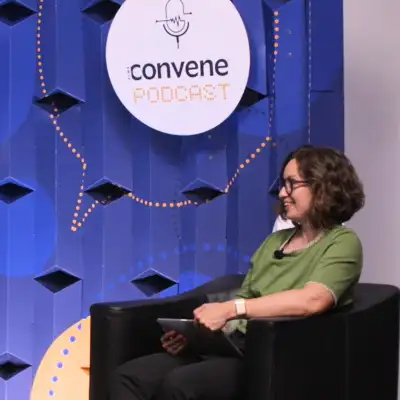Creators and Guests
What is PCMA Convene Podcast?
Since 1986, Convene has been delivering award-winning content that helps event professionals plan and execute innovative and successful events. Join the Convene editors as we dive into the latest topics of interest to — and some flying under the radar of — the business events community.
Convene Talk, ep. 72/Aug 01, 2025
*Note: the transcript is AI generated, excuse typos and inaccuracies
Magdalina Atanassova: This is the Convene Podcast. Welcome to another episode of the Convene Talk. Jen, over to you and today's topic intro.
Jennifer N. Dienst: Thanks Maggie.
So I thought it would be interesting to chat about the Big Beautiful Bill which was signed on July 4,
specifically what the impacts are on the events industry in the U.S.
so one of the first things I saw was a release from the Exhibitions and Conferences alliance which applauded the passing of the bill. They highlighted some positives to come out of this,
mostly related to tax reform and workforce issues.
That includes more competitive business rates.
It also means that the tax exempt status of nonprofit associations and their events will remain intact. So that's great news.
And it also allows for Pell Grants to be used for job training as well as 529 plans so that can be used for professional certifications and licenses.
That's a really big deal for skilled workforce training, which is something our industry relies on and needs.
There's a great quote in ECA's release from Marcia Flanagan of the International association of Exhibitions and Events IAEE,
who said that our industry's collective feature depends on having a highly skilled workforce to deliver the world class business and professional events that our customers expect.
The workforce policies and the One Big Beautiful Bill act will help equip our future workforce with necessary training and credentials they need to have great careers, our industry.
There were some other wins, mostly related to travel. These were also highlighted by the US Travel Association.
There's going to be money set aside to modernize our air traffic control system. I think this is something we've all heard a lot about in recent years and we're all happy about that.
We're also going to see increased staffing for the U.S. customs and Border Protection or the CBP that will help reduce wait times at airports, which is also fantastic news for anyone who's traveling, whether you're an attendee or a planner.
They're also going to set aside some money to improve border security technology and they're going to expand that includes like expanding biometric points of entry and exit so when your face gets scanned at the kiosk instead of having to wait in that long line.
Awesome. We love that.
They're also going to expand the visa waiver program and set aside some money for security for some of the big upcoming events that we're hosting, including the 2026 World cup and the 2028 Olympic Games in LA.
So great. We have some good things. However,
you know, I've read some not so great takes one of them related to travel is that we're going to see visa fees jump. This is reported by Travel.
There is now going to be a $250 visa integrity fee for visitor visas and the ESTA fee for visa waiver program travelers is going to jump to $40, up about $20.
So not a huge jump. It's not a huge deal, but those are going to increase.
I think the big news that a lot of people are concerned about is how much funding Brand USA is, is going to lose. So they saw their budget reduced by 80%.
David Adler of Gathering Point News, the founder of Biz Bash, he pointed out on LinkedIn that this is an $80 million mistake.
And he wrote an editorial about this. And he makes the larger point that the US Is really far behind and this is going to put the US Even further behind when it comes to treating events as strategic assets.
He pointed out in his post that this means there's no consistent international messaging,
no federal presence at global convening tables, and no infrastructure to support U.S. destinations competing for the world's biggest summits, congresses and exhibitions.
And in a moment when countries like Singapore, the UAE and Canada are using events as economic and diplomatic strategy, the US Just cut the mic. This isn't about tourism alone.
It's about visibility,
reputation, and relevance.
So I thought that was,
you know, really interesting. We have some positives and we have some negatives. I'm really curious what you all are thinking about this. Do you think one outweighs the other?
Are you worried about how our country is going to struggle with these cuts to Brand usa?
Especially when you consider how much we're going to be in the spotlight in the next few years for those big global events,
which also includes the 250th anniversary of our country's founding, which is expected to see some international visitation as well.
So, Barbara, tell me what's on your mind.
Barbara Palmer: You know, all the things that were in the bill that people are happy about.
Yay.
I mean, they've been long fights and so that's great.
I don't think it has to be like a binary.
Like, yes, that's great.
And I guess the thing that I notice and this is not in any way to criticize Brand USA,
but when I look at what other organizations that market meetings internationally do,
they all have an international focus.
They're not Brand USA.
It's not like, oh, we are marketing USA. And I think it's important,
of course,
to focus on the interests of the country.
But it just makes me wonder about,
like, I Just don't think it cuts off the opportunity to work with other organizations internationally to, to,
to fill that gap with an internationally focused organization. Because I think cities and states are already competing to get meetings here.
And this could be just a big hole in my knowledge about the international,
about the strategy of Brand USA.
But I'm just seeing like an opportunity to work more collaboratively with other countries.
Jennifer N. Dienst: For the US Well, I think the Brand USA is really about promoting the United States in its entirety as a destination for travel and events.
So, like,
you know, like how France has an entity that's similar.
Singapore, of course, I mean, Canada, Destination Canada is a really good example of that. And I think it's kind of like when I work with those entities on our sponsored content,
it's kind of. I think what stands out to me is promoting like their knowledge economy,
like for meetings and how it's not just one destination, but that you can, you know, potentially come and visit more than one. And the country as a whole has,
you know, a lot of assets. It's not just one destination.
But you're right. When you have so many other DMOs that are promoting,
especially because we're so big, I think that's it too. Like the United States is so big and so vast and so diverse.
It can, you know, I can understand that. But I think one of the things that I keep remembering and going back to is the session at Convening Leaders,
our last Convening leaders in Houston that was all about the state of the meetings, industry and tourism and travel.
And there was a rep, you know, Fred from Brand USA was on the stage along with someone from Saudi Arabia's new DMO, which I'm blanking. I think it's just Visit Saudi Arabia.
Visit Saudi Arabia. I can't remember the exact name I've represented from Singapore. A few others were there and I remember someone pointing out that the US is one of the few without a tourism minister,
whereas these other countries have that.
So I think on the, like, grand stage,
it's when we don't have a strong presence like that, we don't have a tourism minister. And obviously, like now we've complete, like almost completely defunded our Brand USA.
Like, I think what David is saying is, is really important. It does potentially take us out of the running for these very large grand global events like Olympics,
because I think they're out there really competing for those,
like the World Expo,
you know, some of the bigger sporting events. So I'm curious to see the effect on that. Will we See fewer global events, want to come to the U.S. I think that's something that people are already nervous about because of the political environment and how,
you know, that's changed since Trump took office. But anyway, Michelle, what are you thinking?
Michelle Russell: I just wanted to go back to like the history of Brand USA because it's really not that old.
I remember when it was started basically because we had lost a significant portion of international travel and so we wanted to make up ground and that's why it was started and operations only started in 2011.
So it's been only 14 years and I feel like they still hadn't gotten their legs underneath them. And I was excited about Fred Dixon heading up the organization because we know him from his work at NYC & Co.
And Kate,
you, I think worked with him.
So I was excited to see that. But I agree with you what you just said. It feels like a knock on kind of effect now that.
Jennifer N. Dienst: We’re going to.
Michelle Russell: See the impacts of this, a lack of funding on top of already this situation where we've heard in our surveys that planners are seeing fewer international participants and they're hearing from their members that they don't want to travel to the US because of this perception that we're not a welcoming country.
So that I think is concerning because it feels like another shot, you know,
shot fired to our industry.
So that I think for me when you said before, like where is there more focus? I feel like that I agree with David. That's like a bigger, that's a bigger negative impact of the big beautiful bill than I think those other positive pieces are.
Just because it's on top of already not very good situation.
Barbara Palmer: You know, I,
you guys have really convinced me too.
I guess I'm just thinking that it's so crucial that this bill cannot stop that.
Like we can't, the industry can't stop that,
stop strategizing on how to get those big events and how to solve the problems collectively that are barriers to people coming here and thinking there's gotta be some other avenues in the interim where people could like other organizations that could fill in the gap.
But I agree it's a, it's a.
Michelle Russell: Big blow also because they hadn't yet even established like a meetings division for Brand USA. I think that's where they were going to start to put some of their efforts.
So mostly it was really for tourism and it was the greatest benefit I read anyway was with the smaller destinations because New York City and some of the other big cities don't really need the exposure They've got a reputation already, a brand reputation.
But it was the smaller cities that were getting lifted up from this kind of promotion.
But again,
we didn't even get to the point where we had an established division for Brand USA for business events. And I like David's comment about it kind of reflects a lack of understanding of not only the economic value of events but the legacy impact which I have seen in Europe and other parts of the world.
They get and they talk about much more than we talk about the positive benefits of scientific conferences. We tried a while ago to talk to planners to see like what are the long term outcomes of your event.
Because I think even like with medical events where they talk about breakthrough technologies or therapies or drugs or whatever,
we don't like connect the dots years later like this,
this disease was eradicated or this disease has a much lower incidence because of this event where this breakthrough was shared widely with physicians. So I agree with him. It's like we just don't connect the dots here.
We see these events as one off events that we keep trying to attract but we don't recognize as a society that this is where not just that business gets done, but it's where knowledge is shared that really can shape our future.
Kate Mulcrone: Yeah.
Magdalina Atanassova: All this made me think how would the competition on local level change in the US because in my mind now all the local DMOs and potentially if you have CVBs,
they'll start competing for business and not collaborating necessarily for it.
I've seen that in Europe in much smaller destinations which,
you know, you think it's kind of obvious they should collaborate to win these bigger pieces of business but just because of the way they are set up, they end up competing for the same piece of business.
So I wonder, especially like Jen says, the us, such a vast country,
would that change or I don't know, potentially it would actually bring a positive and it would strengthen collaboration. Maybe the organizations will now realize they have to,
you know, sit at the same table and decide together rather than rely on a bigger body that's nationally funded. I'm not sure, I guess we'll have to wait and see.
But that, that's kind of where my mind went.
And what's the strategy? Right. I think that's the bigger question.
What was the original strategy of Brand USA and why do they think so easily that they can cut the funding and leave it at bare bones?
Michelle Russell: I think that this just goes back to this. Like I remember years ago a DMO leader telling me that it's like this Marketing thing is nice to have but not necessary.
So in certain destinations,
the DMO, some of the monies that the DMO has are then taken out and used for other purposes when there's a budget deficit or something because it's seen as like, this is not essential, these are not essential services.
Marketing, this destination is not an essential service when in fact it has,
it does have an effect on local economy,
on jobs, on all of those things.
But I think it's just sort of a short sighted approach.
In other news, I know Jen, you were talking about how the positive side is having more TSA border personnel to make it easier to travel.
I did hear today that you no longer have to take off your shoes at certain airports.
So that is going to help with the lines. Hopefully for people who already have TSA PreCheck and clear, you didn't have to do that. But for regular travelers now at major airports, that's no longer going to be part of the process.
Jennifer N. Dienst: I think they changed some of the rules around liquids too.
I forget what it was. But I'm pre check and clear. So I never even think about this stuff.
But I think they've, they've lightened up on that too.
But something else that David Adler's editorial mention that I didn't realize that I thought was interesting is that Trump also just announced like days ago that farm and hospitality workers,
many of whom are undocumented here, would be exempted from the ICE raids.
Now this is just something he said and it sounds like there's been some like chaos after that.
But I think that that's, that's interesting. Like obviously he see and he makes, he goes on to make the point that like,
like Trump obviously is built hotels, he understands the value of the hospitality industry. Like this is such a disconnect that he doesn't, you know, defunding Brand USA and not seeing the value of branding when Trump has made a name for himself when it comes to like branding and, and image and not seeing the potential power of that and branding the country that he runs to attract more events and tourism is not,
I mean that's like he points out, he's like, that's, you know, there's a huge disconnect in there. Not that anything Trump does makes sense, but it's just a good point.
Magdalina Atanassova: I think he said.
Michelle Russell: Did he even read that part of the bill? That's a question.
Jennifer N. Dienst: Oh, I, I don't think he reads it all. I don't think he even knows how to read. Yeah,
we'll see. We'll see when I come back from my international trips, if I get back country anyway.
Kate Mulcrone: So what I would add to this, though, is I'm afraid that it's a feature,
not a bug,
that we're seeing these huge cuts right at a time when we have the Olympics coming up, we have the World cup coming up.
The effects of cutting this marketing now aren't going to be seen for a couple of years.
And, and the strategy will be to blame it on the next person.
And it's like what you said earlier, Michelle. You can't really say,
oh, this breakthrough in treating Alzheimer's happened seven years after these people met in Munich to discuss some other thing.
We can't trace it,
but we're going to have to live with it in the future.
Something I find interesting, though,
ahead of the World cup next year.
We're already seeing issues with the qualifying events that are held in the US Right now.
Last week,
CBS News ran a story that said that the FIFA World cup tickets for games in New Jersey had been slashed from $473.90 to $13.40. And that's for a game that's actually being played later today.
And that leaves me wondering,
what's it gonna look like next year?
Are people gonna travel from all over the world to see the World cup next year here,
or are these qualifying events this year a barometer that we should be concerned about?
And of course,
where would that concern be happening at Brand USA? They would probably be the people kind of keeping an eye on this and seeing if we need some kind of coordinated response.
Michelle Russell: So did they attribute in the story what the lack of interest in attending the qualifying games? Did they have any reason?
Kate Mulcrone: They had a few things to say about that, yes.
First of all, it's not all of the matches. So the story says many matches during the tournament have had sparse crowds, but Real Madrid was an exception. They got at least 60,000 people for each of their matches.
And they had 76,611 people for their quarterfinal win last Saturday. So not this past Saturday in New Jersey.
And then the other thing I've been wondering about, and this is me getting out of my depth a little bit, but there has been a lot of controversy within FIFA, the organization that runs the World cup,
because Trump met with this guy.
His name is,
I'm not going to say this right. His name is Gianni Infantino.
He is like the president of FIFA. And he didn't go to some important FIFA movie. So he could,
he could meet with Trump instead and so now there's also a ton of people who are huge soccer fans who are pretty mad.
Michelle Russell: The FIFA movie.
Kate Mulcrone: Sorry, I said movie. I meant meeting.
Michelle Russell: Oh, okay.
Kate Mulcrone: Yes. And this. This is from a place called Athlon Sports that I found this.
So I'm. I'm not in any way informed about soccer. I'm not gonna pretend I am,
but I was surprised to see ticket prices fall by over $400.
So I got curious about, like, you asked, why.
But, I mean,
it's not as simple, I don't think, as people don't want to come to the US But a year from now,
what if it is as simple as people don't want to come to the US and this huge money maker for our nation doesn't make us the money we're expecting.
Michelle Russell: Right?
Magdalina Atanassova: Thank you all for the discussion.
Michelle Russell: That was good. Thank you, guys.
Magdalina Atanassova: Remember to subscribe to the Convene Podcast on your favorite listening platform to stay updated with our latest episodes. For further industry insights from the Convene team, head over to PCMA.org/convene. My name is Maggie. Stay inspired. Keep inspiring. And until next time.




